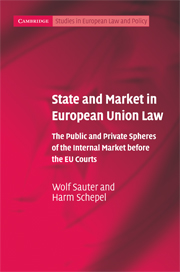 State and Market in European Union Law
State and Market in European Union Law Book contents
- Frontmatter
- Contents
- Acknowledgements
- Abbreviations
- Table of Cases
- 1 Introduction
- PART I Economic activities v. the exercise of public authority
- PART II The Public Private Interface: Articles 31, 86 and 87–88 EC
- 5 Article 31 EC: commercial state monopolies
- 6 Article 86(1): public undertakings, special and exclusive rights
- 7 Article 86(2) EC: derogation for services of general economic interest (SGEI)
- 8 Articles 87–88 EC: State aid
- 9 Conclusion
- References
- Index
- CAMBRIDGE STUDIES IN EUROPEAN LAW AND POLICY
5 - Article 31 EC: commercial state monopolies
Published online by Cambridge University Press: 22 January 2010
- Frontmatter
- Contents
- Acknowledgements
- Abbreviations
- Table of Cases
- 1 Introduction
- PART I Economic activities v. the exercise of public authority
- PART II The Public Private Interface: Articles 31, 86 and 87–88 EC
- 5 Article 31 EC: commercial state monopolies
- 6 Article 86(1): public undertakings, special and exclusive rights
- 7 Article 86(2) EC: derogation for services of general economic interest (SGEI)
- 8 Articles 87–88 EC: State aid
- 9 Conclusion
- References
- Index
- CAMBRIDGE STUDIES IN EUROPEAN LAW AND POLICY
Summary
Introduction
Article 31 EC deals with the position of commercial State monopolies, in particular in so far as they introduce discrimination regarding the conditions under which goods are procured and marketed (for example, in the case of import and export monopolies). As such, it forms a lex specialis in relation to the general rules pertaining to the trade in goods – and following the end of the transitional period it is, like Article 28 EC, directly effective. Also, in dealing with State monopolies, Article 31 EC bridges the free movement and competition rules. Article 31 EC does not require national monopolies of a commercial character to be abolished, nor, as demonstrated by Costa, is it illegal to create new commercial State monopolies.
Instead, Article 31 EC aims to reconcile the existence of such monopolies with the requirements of the establishment and functioning of the internal market – in particular, after the expiration of the transitional period, with the non-discrimination requirement.4 Thus the Member States are required to ‘adjust’ the monopolies concerned.
According to the Court, in its 1997 Franzén Case:
It is clear not only from the wording of Article 37 [now Article 31] but also from the position which it occupies in the general scheme of the Treaty that the article is designed to ensure compliance with the fundamental principle that goods should be able to move freely throughout the common market, in particular by requiring quantitative restrictions and measures having equivalent effect in trade between Member States to be abolished, and thereby to ensure maintenance of normal conditions of competition between the economies of Member States in the event that a given product is subject, in one or other of those States, to a national monopoly of a commercial character.
- Type
- Chapter
- Information
- State and Market in European Union LawThe Public and Private Spheres of the Internal Market before the EU Courts, pp. 131 - 141Publisher: Cambridge University PressPrint publication year: 2009


